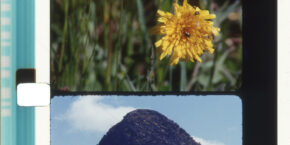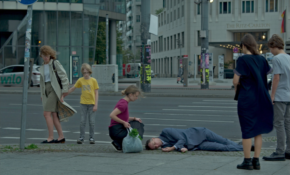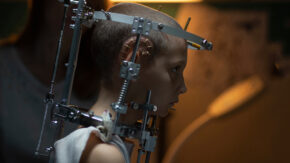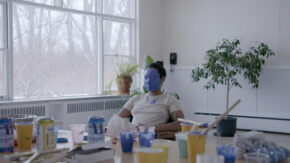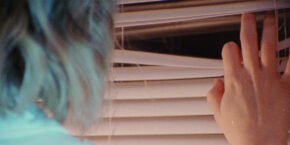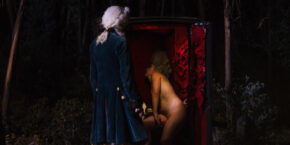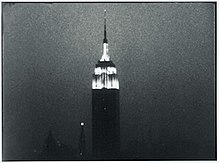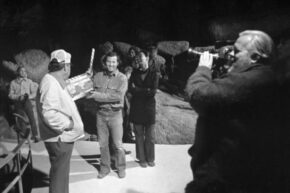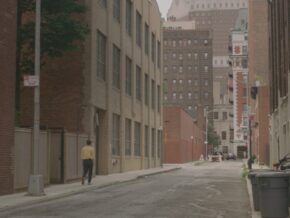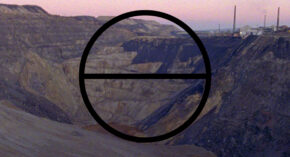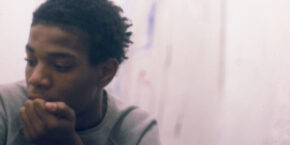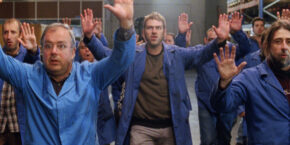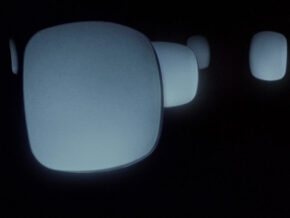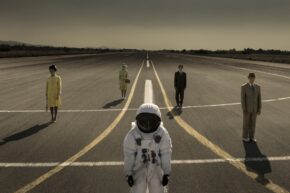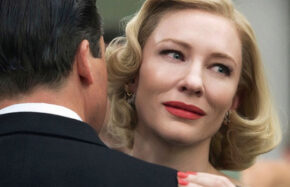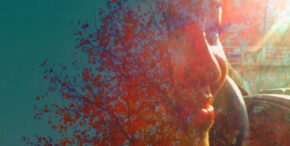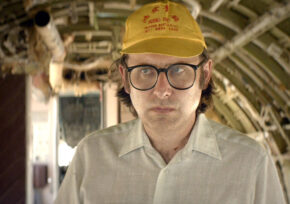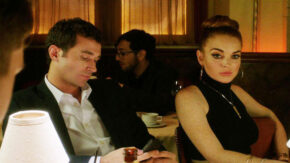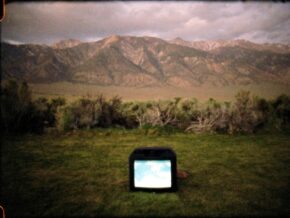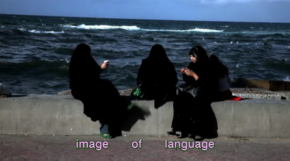Phil Coldiron
Open Source: Some Films by Ross Meckfessel
By Phil Coldiron | 01/18/2024 | CS97, Features, From Cinema Scope Magazine
It requires relatively little mental strain to imagine a world in which all that can be photographed has been; it requires, I think, considerably more to imagine one in which every possible photograph has been made. I find that both of these little thought experiments imply comic narratives—that is, to borrow a definition, ones which resolve in favour of their protagonists. And who might these protagonists be?
Read More → TIFF 2023 | Bouquets 31-40 (Rose Lowder, France) — Wavelengths
By Phil Coldiron | 09/05/2023 | Cinema Scope Online, Columns, CS96, From Cinema Scope Magazine, TIFF 2023
Across 50 years of avowedly experimental practice—“experimental” in the sense that failure is a welcome possibility—she has advanced and refined our understanding of the mechanics of film as much as anyone working today. Naturally, she remains relatively unknown in North America. Born and raised in the Andes, trained industrially on English editing tables, and residing in Provence since the mid-’70s, Lowder has sought, with singular focus, levels of expressive precision beyond the single frame.
Read More → TIFF 2023 | He Thought He Died (Isiah Medina, Canada) — Wavelengths
By Phil Coldiron | 09/05/2023 | Cinema Scope Online, TIFF 2023
By Phil Coldiron One frame is documentary; two is fiction. Two frames are documentary; one is fiction. So far as I know, film’s “Shape as Form” has yet to be written. Whenever someone gets around to adequately theorizing the functions and complications of certain industrial givens, of our wholesome and oppressive little family of rectangles,…
Read More → TIFF 2023 | Music (Angela Schanelec, Germany/France/Serbia) — Wavelengths
By Phil Coldiron | 09/05/2023 | Cinema Scope Online, CS94, TIFF 2023
The compositional tropes of various high modernists, Bresson above all, loom large. Schanelec’s invention, instead, is tonal, a chording of irony and earnestness which allows her to handle the hottest emotions without ever being burned. Taken in other terms, this too looks more like refinement than invention: she is alone among her contemporaries in her capacity to reconcile the Apollonian and the Dionysian.
Read More → After Tragedy: On Angela Schanelec’s Music
By Phil Coldiron | 03/24/2023 | CS94, Features, From Cinema Scope Magazine
The film’s promotional material refers to it as “freely inspired by the myth of Oedipus,” and so it is. Compared with the incidental narrative constructions of the prior two films, this ordering use of myth ensures that however opaque an event may seem in the moment, its place in the logic of the story is equally present, rather than graspable only upon reflection.
Read More → Against Interest: Pierre Clémenti, Filmmaker
By Phil Coldiron | 01/10/2023 | CS93, Features, From Cinema Scope Magazine
We are moved by films because, briefly, deeply, they convince us that the past isn’t irretrievable, that life isn’t forever slipping away. But in his usual manner, Clémenti immediately complicates this, narrowing the perspective to an actor’s: “And at the very moment you’re playing the part, you become the person who will one day look back at yourself.”
Read More → Film/Art | Musique concrète: Lucy Raven at Dia
By Phil Coldiron | 01/04/2022 | CS89, Film - Art, From Cinema Scope Magazine
We begin in the air, a weightless gaze toward a mountained horizon. After some seconds, the camera descends, dropping beneath ground level, replacing the sky with a sheer face of pale earth. It settles, establishing a new ground. This movement is typical of Lucy Raven’s frequently drone-based camera throughout Ready Mix, the single-channel video which comprises the core of her presentation at the Dia Art Foundation’s newly renovated Chelsea location.
Read More → Titane (Julie Ducournau, France/Belgium)
By Phil Coldiron | 09/20/2021 | CS88, Festivals, From Cinema Scope Magazine, Spotlight
The erotic history of the car in cinema extends back nearly to the dawn of the medium: there’s Chaplin, in 1914, asserting in his first film that he’s a more enticing view than the soapbox derbies at the Kid Auto Races (no engines yet).
Read More → “I prefer, where truth is important, to write fiction:” On Radu Jude
By Phil Coldiron | 06/15/2021 | CS87, Features, From Cinema Scope Magazine
In the name of the popular, delighting in reduction and obviousness, a boring assertion: the common ground of every film movement christened a “new wave” over the last 70 years has tended toward revision, a self-conscious desire to provide a true image of the people in opposition to the distorted picture given by whatever relevant iterations of official culture. The banality of this claim can be measured by the volume of cant and platitude produced in support of it, often by the artists themselves. There is, I hope, little need to rehearse these arguments regarding realism, myth, and so on. Who today can help but squirm when faced with the phrase “true image of the people?”
Read More → All the Fountains of the Great Deep: Artavazd Pelechian’s La Nature
By Phil Coldiron | 12/22/2020 | CS85, Features, From Cinema Scope Magazine
By Phil Coldiron Artists who write clearly about their work run a serious risk: that they will be taken at their word. In much of contemporary art this dynamic has descended to the point that the work, the sensuous object, functions as little more than an illustration of the artist’s statement, a vestigial offering to…
Read More → Discrete Charms: Rotterdam’s Tiger Short Competition
By Phil Coldiron | 03/20/2020 | CS82, Web Only
By Phil Coldiron We still have not found a satisfactory way to show new short films. The approach taken for the shorts competition at the International Film Festival Rotterdam—to treat ticketed programs as minimally thematic clusters of individual screenings, separated by a brief question and answer session with the filmmaker if present (and most were)—argues,…
Read More → Pleasurable Surfaces: The Films of Zachary Epcar
By Phil Coldiron | 09/23/2019 | Web Only
If one were to enumerate the major trends in sophisticated American filmmaking in the last decade, it seems to me that Zachary Epcar’s films would provide an adequate summary of such a list. In their wit, their formal restlessness, and their sharp conception of certain stickier corners of the American psyche, they continue the Nelson-Land tradition. Given the intense pleasures of their surfaces and textures, both visual and aural, I will simply attempt to describe them in as much detail as possible, while focusing on the four major works Epcar has made to date.
Read More → Billy (Zachary Epcar, US) — Wavelengths
By Phil Coldiron | 09/06/2019 | Cinema Scope Online, TIFF 2019
By Phil Coldiron If one were to enumerate the major trends in sophisticated American filmmaking in the last decade, it seems to me that Zachary Epcar’s films would provide an adequate summary of such a list. In their wit, their formal restlessness, their sharp conception of certain stickier corners of the American psyche, they continue…
Read More → Liberté (Albert Serra, France/Spain/Portugal/Germany) — Wavelengths
By Phil Coldiron | 09/05/2019 | Cinema Scope Online, TIFF 2019
By Phil Coldiron Published in Cinema Scope #79 (Summer 2019) —I feel like prey. —Perhaps soon you won’t anymore. If there is a dialectical movement to be found in Albert Serra’s decidedly non-dialectical films, it is in the relationship they figure between movement and stasis. Firm in the belief, or delusion, that “chivalry is…
Read More → Film/Art | Manhattan Style: Andy Warhol’s Empire
By Phil Coldiron | 03/26/2019 | Columns, CS78, Film - Art, From Cinema Scope Magazine
From A to B and Back Again. Given that “A” is “Andy,” what might count as a suitable “B”? In the context of the book of Warhol’s “philosophy” bearing that subtitle, it was literal: the Factory superstar Brigid Berlin and Interview magazine editor Bob Colacello, the other halves of the conversations which provided much of the book’s raw material.
Read More → First Person Plural: On Orson Welles’ The Other Side of the Wind
By Phil Coldiron | 09/28/2018 | CS76, Features, From Cinema Scope Magazine
By Phil Coldiron “May he not be knave, fool, and genius altogether?” —Herman Melville, The Confidence-Man: His Masquerade It begins with a death, of course, the first of the many quotations, slips, and rhymes coursing through The Other Side of the Wind, now finally arrived, more than 50 years after word of its conception first…
Read More → Do It Again: On Ricky D’Ambrose’s Words and Images
By Phil Coldiron | 03/16/2018 | CS74, Features, From Cinema Scope Magazine
By Phil Coldiron The quarrel between word and image is, on the eve of the third millennium of an illustrious career, in a period of relative calm, one marked by a casual cohabitation which has produced gratifying results in the arts and considerable trouble elsewhere, where it tends to be mistaken for the decay of…
Read More → Ahead of Its Reflection: Ben Russell’s Good Luck
By Phil Coldiron | 09/28/2017 | CS72, Features, From Cinema Scope Magazine
By Phil Coldiron “Now I am in front of a rock. It splits. No, it is no longer split. It is as before. Again it is split in two. No, it is not split at all. It splits once more. Once more no longer split, and this goes on indefinitely. Rock intact, then split, then…
Read More → BOOM FOR REAL The Late Teenage Years of Jean-Michel Basquiat (Sara Driver, USA) — TIFF Docs
By Phil Coldiron | 09/14/2017 | Cinema Scope Online, TIFF 2017
By Phil Coldiron GELDZAHLER: So they’re kinds [sic] of indexes to encyclopedias that don’t exist? BASQUIAT: I just like the names. Given that this exchange between curator and artist is typical of the latter’s saintly tendency towards terseness, Sara Driver’s decision to render her portrait of the five years before Basquiat exploded onto the art…
Read More → The Nothing Factory (Pedro Pinho, Portugal) — Wavelengths
By Phil Coldiron | 09/07/2017 | Cinema Scope Online, TIFF 2017
By Phil Coldiron In 1978, the earliest year for which OECD labour statistics on Portugal are available, more than 60% of the country’s workforce was unionized. By 1986, the year the country was accepted into the European Economic Community, that number had dropped to just over 40%. Today, following the arc typical of a Western…
Read More → PROTOTYPE (Blake Williams, Canada) — Wavelengths
By Phil Coldiron | 09/06/2017 | Cinema Scope Online, TIFF 2017
By Phil Coldiron Early in the autumn of 1900, four months before Edison closed the Black Maria and five years before the Lumière brothers left the cinematograph business altogether for what they supposed to be less trivial concerns, a storm landed at the booming port town of Galveston, Texas and killed perhaps as many as…
Read More → Would You Like to See a Magic Trick?: Basma Alsharif’s Ouroboros and its Contexts
By Phil Coldiron | 06/23/2017 | CS71, Features, From Cinema Scope Magazine, Interviews
By Phil Coldiron “À quiconque a perdu ce qui ne se retrouve Jamais, jamais!” —Charles Baudelaire On a clear day in the spring of this year, having fallen under the geometric spell of an exhibition of new work by the photographer Sara Cwynar, a young woman found herself on the wrong uptown train and was…
Read More → Moonlight (Barry Jenkins, US)
By Phil Coldiron | 12/19/2016 | CS69, From Cinema Scope Magazine, Web Only
By Phil Coldiron Liberty City, the Miami neighbourhood Barry Jenkins hails from and the setting for much of Moonlight, his exceptional second feature, has a median annual household income of under $22,000; 47% of its population lives below the United States federal poverty line, while nearly a third of working-age adults are unemployed. Grown up…
Read More → Film/Art | Farewell to Storyville: John Akomfrah’s New Essays
By Phil Coldiron | 09/26/2016 | Columns, CS68, From Cinema Scope Magazine
By Phil Coldiron “He began sifting through his store of images for a story to recount to them, shielding this place and its particularities from their imaginations.”—John Keene, Counternarratives “Just because it is possible to invent a narrative excuse for the way something presents itself doesn’t, I think, mean that it is narrative.”—Hollis Frampton Situated…
Read More → True Colours: On Margaret Honda’s Style
By Phil Coldiron | 03/21/2016 | CS66, Features, From Cinema Scope Magazine
By Phil Coldiron Margaret Honda’s sudden emergence, nearly 30 years into her artistic career and two decades on from her first museum show (Recto Verso at Los Angeles MOCA), as a deeply intriguing new figure in filmmaking is anomalous in several ways. Her two films, Spectrum Reverse Spectrum (2014) and Color Correction (2015), in their…
Read More → Carol (Todd Haynes, US)
By Phil Coldiron | 12/21/2015 | CS65, Currency, From Cinema Scope Magazine
By Phil Coldiron It is a question of pleasure after all… Reporting from Cannes, Daniel Kasman concluded his dispatch for Mubi’s Notebook on Carol with an apparently simple question, one to which he admitted he was unable to find a satisfactory answer: “So what is at stake here?” To be certain, the stakes of Todd…
Read More → Necessary Means: Isiah Medina on 88:88
By Phil Coldiron | 09/22/2015 | CS64, From Cinema Scope Magazine, Interviews
By Phil Coldiron One of the enduring problems of the cinema is that André Bazin’s answer to the question, “What is it?” is so convincing that he was able to pass off an ontology of one of its modes, namely realism, as a sufficient description of the whole. Of course, the issue hardly begins with…
Read More → Implications of a Totality: Frames for the Films of Joseph Bernard
By Phil Coldiron | 06/23/2015 | CS63, Features, From Cinema Scope Magazine
By Phil Coldiron In the decade spanning 1975 to 1985, visual artist Joseph Bernard completed more than 100 films in Super 8mm. Frustrated by a lack of funds, materials, and attention, he withdrew from filmmaking and, ultimately, public art production entirely, though he remained on the faculty at Detroit’s College for Creative Studies, retiring in…
Read More → The Funniest Joke in the World: On Rick Alverson’s Entertainment
By Phil Coldiron | 03/26/2015 | CS62, Features, From Cinema Scope Magazine
By Phil Coldiron When viewed from within the bounds of the traditional, psychologically involved viewer, Entertainment, Rick Alverson’s second mature feature following The Comedy (2012), plays as the darkly comic passion of a man circling the drain leading down from one symbolic scene of death to another; an unpleasant journey, but still, a journey. It…
Read More → The End of Cinema: La última película
By Phil Coldiron | 08/28/2013 | CS56, Features, From Cinema Scope Magazine
By Phil Coldiron What comes at the end of cinema? Not what comes after cinema—a good question for marketing gurus like Spielberg and Lucas and Cameron to lock themselves in a room and argue over until they expire, choking on their own hot air—but right there at the end, in death tranquil or terrifying or…
Read More → Pretending That Life Has No Meaning: Paul Schrader’s The Canyons
By Phil Coldiron | 06/26/2013 | CS55, Features, From Cinema Scope Magazine
By Phil Coldiron It starts with a look. And then another, and another, and before you know it 90 minutes have gone by in a rush of looks, because that’s all anyone does in Los Angeles—they look. The fact of it is that most of this looking is at the back of someone else’s car…
Read More → Blood and Thunder: Enter the Leviathan
By Phil Coldiron | 09/11/2012 | CS52, Features, From Cinema Scope Magazine
Let’s start with a coincidence. The title of Part I, Chap. 1 of Thomas Hobbes’ Leviathan: “Of Sense.” The name of the Harvard project headed by Lucien Castaing-Taylor, whose new film, made in collaboration with Véréna Paravel, shares a title with Hobbes’ seminal work of political philosophy: the Sensory Ethnography Lab. This isn’t to say…
Read More → Eight Footnotes on a Brief Description of Footnotes to a House of Love, and Other Films by Laida Lertxundi
By Phil Coldiron | 06/24/2012 | CS51, Features, From Cinema Scope Magazine
By Phil Coldiron …A group of young people1 in the California2 desert.3 A radio.4 A house that’s little more than the idea of a house.5 A woman6 crosses a room, passes by the camera,7 says, “You’re leaving me…”8 1. What does it mean to make youth cinema in America today? While Hollywood aged parabolically…
Read More → Talking Pictures: Jean-Luc Godard’s Introduction to a True History of Cinema and Television
By Phil Coldiron | 05/18/2012 | Cinema Scope Online
By Phil Coldiron From April to October of 1978, Jean-Luc Godard made seven trips to Montreal’s Concordia University, delivering two lectures on each occasion. These lectures followed a simple format: the morning was devoted to showing excerpts from classic films, as well as works from the first decade of Godard’s career in their entirety; the…
Read More → 

